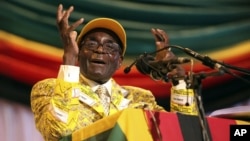HARARE —
Zimbabwe today marked 33 years of self-rule with President Robert Mugabe calling for peace ahead of the forthcoming crucial general elections and the unconditional removal of sanctions imposed on him and some senior Zanu PF officials.
Officiating at the 33rd independence celebrations held at the National Sports Stadium in Harare, President Mugabe said political parties should campaign peacefully ahead of elections expected to be held sometime this year.
As fresh polls draw nearer, Mr. Mugabe said individuals seeking to represent their respective parties in various constituencies should desist from engaging in violence. He urged local structures of political parties to promote peace.
The president, who has ruled the country since independence, urged police to ensure that all perpetrators of political violence should be brought to book, adding that Zimbabwe should not be known for a culture of violence during elections.
Turning to re-engagement talks between Zimbabwe and the west, Mr. Mugabe said countries that imposed sanctions on him and some senior Zanu-PF officials should unconditionally lift those restrictive measures if the negotiations are to be deemed successful.
The European Union and some countries such as Britain, Australia, New Zealand and the United States imposed sanctions on Mr. Mugabe and his inner circle in 2002 for alleged human rights violation and election rigging.
The president commended the security forces for maintaining peace in the country and urged them to remain steadfast in their defense of the country's territorial integrity and sovereignty.
Although many Zimbabweans welcomed Mr. Mugabe's remarks, some like Kuwadzana resident Chenai Runyowa said that 33 years of independence are meaningless if citizens continue to be subjected to arbitrary arrests and unemployment, among other issues.
Zimbabwe attained its independence from British colonial rule on 18 April, 1980, after a protracted liberation war.
Prime Minister Morgan Tsvangirai and his deputy Arthur Mutambara attended the main celebrations while the leader of the other MDC formation, Industry Minister Welshman Ncube was conspicuous by his absence.
Ncube on Wednesday urged the Southern African Development Community to intervene and break what he said was a ploy by the president and Mr. Tsvangirai to sideline his MDC formation from crucial decision-making processes in the country.
Meanwhile, VOA reporter Tatenda Gumbo turned to ZANU-PF deputy director of information Psychology Maziwisa and policy and research director Charles Mangongera of the MDC-Tsvangirai formation to discuss the significance of the day.
Mangongera said the average Zimbabwean is dissappointed by the state the country is in right now, 33 years after independence. Maziwisa disagreed saying Zimbabweans are and will continue benefiting under President Mugabe.
Officiating at the 33rd independence celebrations held at the National Sports Stadium in Harare, President Mugabe said political parties should campaign peacefully ahead of elections expected to be held sometime this year.
As fresh polls draw nearer, Mr. Mugabe said individuals seeking to represent their respective parties in various constituencies should desist from engaging in violence. He urged local structures of political parties to promote peace.
The president, who has ruled the country since independence, urged police to ensure that all perpetrators of political violence should be brought to book, adding that Zimbabwe should not be known for a culture of violence during elections.
Turning to re-engagement talks between Zimbabwe and the west, Mr. Mugabe said countries that imposed sanctions on him and some senior Zanu-PF officials should unconditionally lift those restrictive measures if the negotiations are to be deemed successful.
The European Union and some countries such as Britain, Australia, New Zealand and the United States imposed sanctions on Mr. Mugabe and his inner circle in 2002 for alleged human rights violation and election rigging.
The president commended the security forces for maintaining peace in the country and urged them to remain steadfast in their defense of the country's territorial integrity and sovereignty.
Although many Zimbabweans welcomed Mr. Mugabe's remarks, some like Kuwadzana resident Chenai Runyowa said that 33 years of independence are meaningless if citizens continue to be subjected to arbitrary arrests and unemployment, among other issues.
Zimbabwe attained its independence from British colonial rule on 18 April, 1980, after a protracted liberation war.
Prime Minister Morgan Tsvangirai and his deputy Arthur Mutambara attended the main celebrations while the leader of the other MDC formation, Industry Minister Welshman Ncube was conspicuous by his absence.
Ncube on Wednesday urged the Southern African Development Community to intervene and break what he said was a ploy by the president and Mr. Tsvangirai to sideline his MDC formation from crucial decision-making processes in the country.
Meanwhile, VOA reporter Tatenda Gumbo turned to ZANU-PF deputy director of information Psychology Maziwisa and policy and research director Charles Mangongera of the MDC-Tsvangirai formation to discuss the significance of the day.
Mangongera said the average Zimbabwean is dissappointed by the state the country is in right now, 33 years after independence. Maziwisa disagreed saying Zimbabweans are and will continue benefiting under President Mugabe.





